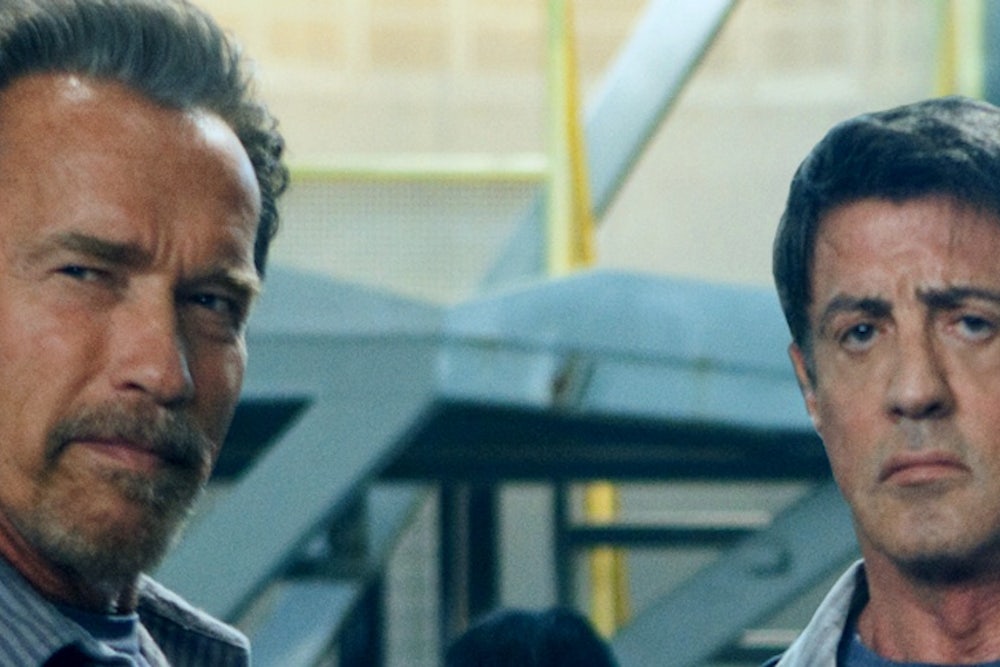The latest Stallone/Schwarzenegger action flick, unimaginatively titled Escape Plan, seems intent on reminding people that Sylvester Stallone and Arnold Schwarzenegger still exist. With the exception of The Expendables and its sequel, which both limped to good international box office totals, Stallone hasn’t been in a hit movie in two decades. Arnold Schwarzenegger hasn’t had anything resembling a blockbuster (minus the third Terminator film) since 1996’s Eraser. The good old days were a long time ago. Indeed, one wonders whether these two dinosaurs realized that they signed on for a bizarrely left-wing movie with very little fighting or gunplay.
Both men made their names in a different political era. Stallone followed up the early Rocky movies by making a number of right-wing action films, most notably the Rambo series and Cobra (1986). (After several Americans were released by terrorists in Lebanon, Reagan exclaimed, “Boy, I saw Rambo last night. I know what to do the next time this happens.”) Schwarzenegger’s films were less explicitly political, but he was a walking NRA-endorsement with a macho image who campaigned for Republicans. (Schwarzenegger, of course, eventually went beyond mere campaigning for others). But action movies changed: rather than Schwarzenegger and Stallone (and lesser specimens like Chuck Norris, Dolph Lundgren, and Steven Seagal), Matt Damon and Tom Cruise began to inhabit brainer heroes. Audience appetite for mindless brawn seemed to disappear almost entirely.
Escape Plan tries to cope with this reality by making Ray Breslin, the prison security expert played by Stallone, a deep-thinking, cerebral protagonist. Breslin is not to be confused with Ray Quick (Stallone’s character in The Specialist (1994)), or Ray Tango (Stallone’s character in Tango & Cash (1989)). This is especially confusing because Tango also found himself in prison, as did Frank Leone (Stallone’s character from Lock Up, also 1989). Stallone was, similarly, sent away in Demolition Man (1993), Judge Dredd (1995), First Blood (1982), and Rambo: First Blood Part II (1985).
Given that Stallone’s facial expressions and demeanor don’t change much from one film to the next, the viewer can be forgiven for thinking that Stallone himself has real knowledge of prison life. Ray Breslin certainly does. According to a colleague, he “possesses a unique set of skills.” Not only did he (literally) write the book on how to secure a prison, but he spends his life escaping from maximum security facilities. (We glimpse one of his ludicrous escapes in the opening scene, which (SPOILER ALERT) he accomplishes with some chocolate milk). He makes a good living because the federal government pays his team of private contractors to identify security gaps. This works well enough until he is sent to a state-of-the-art facility, which appears to be run by the American government in coordination with a number of foreign countries. In reality, however, it is presided over by evil warden Jim Caviezel, who knows Stallone’s identity but has his own reasons for wanting to keep him there permanently.
Stallone’s only hope is Emil Rottmayer, an associate of the infamous “Robin Hood” (he robs from the rich to give to the poor). After some sparring, Rottmayer (Arnold Schwarzenegger) and Breslin become friends, and join forces to break out of the prison, even though they don’t at first know where it is located. (Stallone soon solves that problem by figuring out the latitude—courtesy of a sextant—and making an absurdly lucky guess about longitude). The prison itself has two central components: glass cells in one giant room (so everyone can be monitored), and a huge mess area, where the prisoners spend their days talking and scheming, and no one seems to bother them. (“Given the circumstances, this is an absolutely terrible prison,” my viewing companion said to me). Indeed, most of the movie consists of alternately failed and successful escapes, all of them easily preventable. The warden will torture and kill prisoners, but he absolutely will not prevent them from having lunch together.
The performances, sorry to say, are not much better than the plot. “You look like the type of guy who finds things interesting,” Schwarzenegger says to Stallone. In fact, Stallone looks practically asleep for much of the movie, which might have been okay had he been convincing as a prison expert. Instead, his eye for guard movements and schedule changes is even more ridiculous than it otherwise would be. Schwarzenegger at least seems to be having fun: he speaks in German, makes a joke about oral sex, and cracks several poor one-liners. Caviezel is your typical sadistic wacko (he even has a hobby collecting butterflies). And in the strangest supporting turn, Sam Neill appears as a conflicted prison doctor. (Don’t worry: he eventually consults a medical ethics book).
Still, the most notable thing about the film is the politics. There were negative references to rendition and the national security apparatus; the villains engage in water boarding; and the aforementioned “Robin Hood” character is heroic precisely because he aims to bring down the financial markets. Meanwhile Stallone and Schwarzenegger befriend a Muslim inmate, whose faith is treated with seriousness (and given substantial screen time) and whose sole purpose is to impart the lesson that bigotry is bad, and that we are all brothers under the skin. These aspects of the plot, combined with the fact that Stallone’s character is supposed to have a deep inner life (and tragic back-story), are what makes the movie such a bizarre meld. If the film had starred Matt Damon, it would still have been terrible, but it at least would have felt coherent.
Escape Plan comes across as a poor attempt to inject some testosterone into two former stars, but they are limited actors whose only remaining recourse for audience empathy is self-deprecation. And here, the cheesy one-liners, which faced such diminishing returns in The Expendables, are few and far between. Don’t expect this film to restart any careers; if anything, it will remind people why a couple of prominent ones ended.
